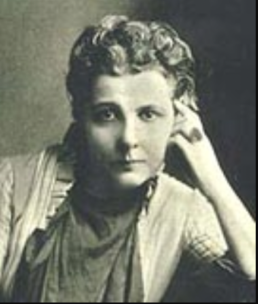These life stories may contain descriptions of childhood trauma and abuse, as well as images, voices and names of people now deceased. If you need help, you can find contact details for some relevant support services on our support page.
Notable British feminist and theosophist, Annie Besant (1847-1933), was in foster care as a child.
Annie Wood was born to Irish parents, William Wood and Ellen Morris, who left Dublin, Ireland for England in 1845 because of the famine. William Wood was from a prominent family, one relation having been the Lord Mayor London and another was Lord Chancellor.
William Wood died of tuberculosis when Annie was five years old. Instead of taking charity, Ellen took over the running of a boy’s boarding house at the Harrow School. Because Ellen considered it unsuitable for Annie to live at the boarding house, the child was put into foster care in Dorset with Ellen Marryat (the sister of author Captain Frederick Marryat), a well-educated woman who took in girls from ‘respectable families’ and educated them.
Annie lived with Ellen Marryat until she was sixteen at which time she returned to Harrow.
Annie ‘drifted’ into marriage with clergyman Frank Besant in 1867 and the couple had two children. Annie’s continuing doubts about conventional Christianity led her to refuse to take holy communion, even though her husband insisted she do so if she wanted to stay with him.
After she separated from Frank (keeping her daughter with her while Frank kept their son), Annie moved to London where in 1866 she met Charles Bradlaugh, founder of the National Secular Society. Bradlaugh, famous and feared for being an atheist, became a friend and mentor to the young Annie and remained in that role over the next twenty years.
Under Bradlaugh’s guidance, Annie Besant became an effective public speaker for the National Secular Society and against the power of the Christian church. The two also edited the National Reformer, a weekly paper which advocated for social reforms such as national education, trade unions, and women’s suffrage.
Besant became famous when she published—with Charles Bradlaugh—a book on birth control by campaigner Charles Knowlton and was prosecuted and tried in 1877. The trial was “a major public event” and although the court found against them for publishing an “indecent and obscene publication”, they did not go to prison.
Sadly, however, Frank Besant applied for and gained custody of their daughter, Mabel, on the grounds that “her views made her an unfit guardian” (Byrne).
Annie Besant became a prominent member of the 1880s revival of socialism, along with George Bernard Shaw, and it was Shaw who encouraged Besant to join the Fabian Society. She was active in a number of social reforms, including the London matchgirls strike of 1888—which she called “white slavery”—when she successfully challenged the match manufacturers to improve working conditions.
Besant was involved with Theosophy from the late 1880s and moved to Madras, India in 1893. There she became involved in the independence movement and in education, founding the Central Hindu College which later became the Central Hindu School. Besant also encouraged Madan Mohan Malaviya in establishing the Banaras Hindu University.
In 1907, on the death of Theosophy co-founder (with Helena Blavatsky) Colonel Henry Steel Olcott, Annie Besant was made President of the international Theosophical Society, a position she held until her death. She was also elected President of the Indian National Congress in 1917.
From 1909, Annie Besant nurtured the career of a fourteen-year-old boy, Jiddu Krishnamurti (1895-1986), who she believed was going to be the World Teacher theosophists had predicted would emerge. Krishnamurti rejected this role in 1929.
Annie Besant continued to campaign for Indian independence and advocate for theosophical causes until her death.
References:
“Annie Besant.” In Our Time, BBC Sounds, 21 June 2012. https://www.bbc.co.uk/sounds/play/b01jxtd7
“Annie Besant (1847-1933).” BBC History, 2014. https://www.bbc.co.uk/history/historic_figures/besant_annie.shtml
“Annie Besant. British Social Reformer.” Encyclopaedia Britannica, 2021. https://www.britannica.com/biography/Annie-Besant
Byrne, Angela. “Annie Besant, the first woman to endorse birth control.” The Irish Times, 27 November 2018. https://www.irishtimes.com/life-and-style/abroad/annie-besant-the-first-woman-to-endorse-birth-control-1.3711113
Image available here.
